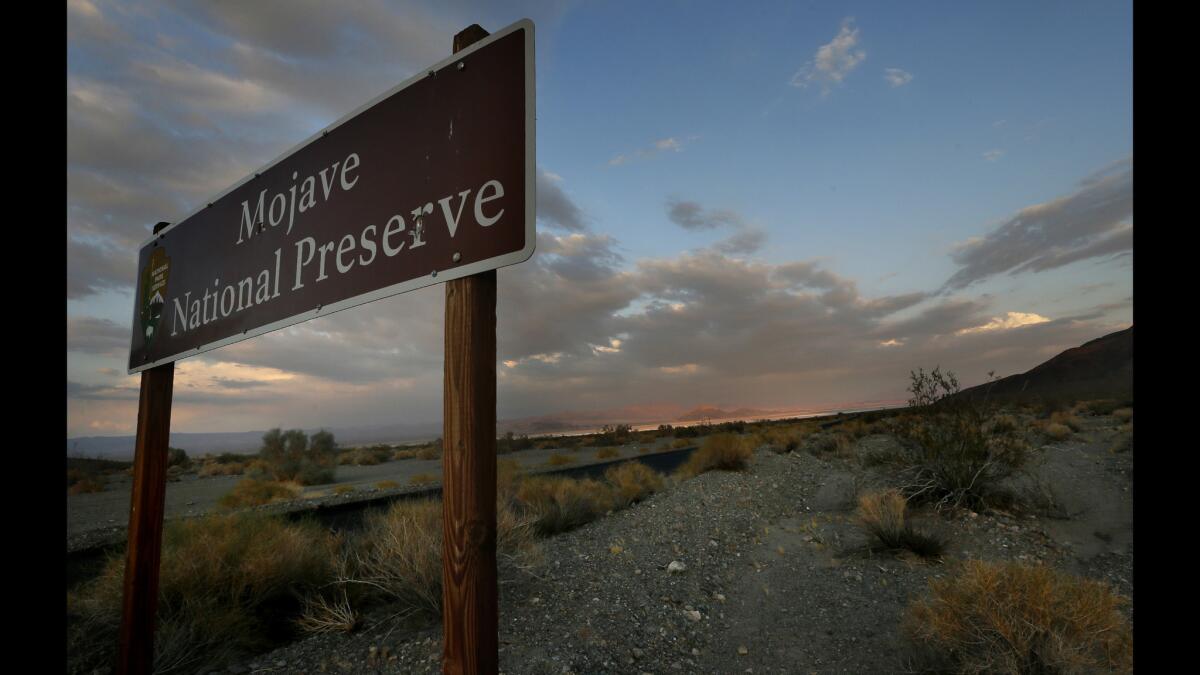L.A. won’t buy power from Mojave Desert solar plant, after all

A proposed solar power project near the preserve leaves environmentalists concerned that it will disrupt the historic habitat of native desert bighorn sheep.
- Share via
The city of Los Angeles has dropped plans to buy electricity from a controversial solar plant proposed for the Mojave Desert, delivering a serious blow to the most environmentally sensitive renewable energy project in the state.
City officials said Thursday that the Soda Mountain Solar Project would be too damaging to bighorn sheep, desert tortoises and other wildlife near the site along Interstate 15, just south of Baker and less than a mile from the Mojave National Preserve.
The decision was made after a Department of Water and Power review found that other proposed renewable energy projects would charge the city less for electricity and would have fewer challenges in delivering the power to Los Angeles.
Bechtel Corp., developer of the plant, had hoped that Los Angeles would buy most of the power. Ron Tobler, project development manager for Bechtel, said the company is negotiating with other prospective customers for the electricity.
Analysts said those prospects are remote — and time is of the essence.
If the project does not get a power purchase agreement signed soon, “it will be extremely difficult for it to proceed with development,” said Cory Honeyman, a senior solar analyst at the consulting firm GTM Research. That’s largely because the window is closing on eligibility for a 30% federal tax credit for the project.
The city’s decision came as a welcome surprise to environmentalists.
“The Sierra Club is delighted to see the city do the right thing and choose not to sign a power purchase agreement with this harmful project,” said Sarah Friedman, a senior campaign representative with the organization. “We support clean energy, but this is the wrong place to do it.”
Bechtel said it selected the site because of its sunny skies, flat terrain and proximity to the Marketplace-Adelanto transmission line, which is managed by the DWP and provides electricity to about 3.9 million people in a service area covering 465 square miles.
Opponents including business leaders from the nearby communities of Baker, Newberry Springs and Shoshone urged the Bureau of Land Management to reject the project, which they believe would compromise efforts to restore migration routes for about 100 bighorn sheep.
A week ago, the BLM attempted to address environmental concerns by issuing a final environmental impact statement proposing to eliminate arrays of solar panels north of the I-15, reducing the photovoltaic solar facility’s size from 2,557 to 1,923 acres and lowering its output from 358 to 264 megawatts.
The decision angered environmentalists, who wanted the BLM and its parent agency, the Department of the Interior, to scuttle the project as too harmful.
David Lamfrom, a spokesman for the nonprofit National Parks Conservation Assn., said the city’s decision is one “the desert has been waiting for: Los Angeles stands up to take the leadership role at a time when the Department of the Interior refuses to protect our natural resources.”
“This place deserves to continue as it exists right now,” he said.
Biologists are working on proposals to reestablish key migration corridors for bighorn sheep separated from the north and south Soda Mountains by the I-15. Such linkages would help ensure that bighorn sheep populations, which have experienced remarkable growth in recent years, do not become genetically isolated.
One plan under consideration is to use tubs of drinking water to coax sheep, which rarely cross the 1-15, to walk through culverts under the freeway.
Another approach calls for constructing a concrete bridge so sheep could cross over the freeway, which links Los Angeles with Las Vegas. That proposal, environmentalists say, could be costly and require approval from agencies including the state Department of Fish and Wildlife and Caltrans.
Buyingpower from the Soda Mountain plant could help the city meet its goal of providing 35% of its electricity from renewable sources by 2020 and eliminate coal from its power mix by 2025. But Garcetti said the city is looking at renewal projects closer to the city to meet the goals.
Bechtel’s request to use the DWP’s transmission lines to deliver power into the electrical grid is still under review, city officials said.
More to Read
Sign up for Essential California
The most important California stories and recommendations in your inbox every morning.
You may occasionally receive promotional content from the Los Angeles Times.











